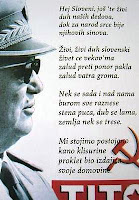The Brabançonne- English Version

The Brabançonne (Song of Brabant) is the national anthem of Belgium. The anthem has a French, a Dutch and a German version, for the three official languages of the country.
According to legend, the Belgian national anthem was written in September 1830, during the Belgian Revolution, by a young revolutionary called Jenneval, who read the lyrics during a meeting at the Aigle d'Or café.
Jenneval, a Frenchman whose real name was Alexandre Dechet (sometimes known as Louis-Alexandre Dechet), did in fact write the Brabançonne. At the time, he was an actor at the theatre where, in August 1830, the revolution started which led to independence from the Netherlands. Jenneval died in the war of independence. François Van Campenhout composed the accompanying score and it was first performed in September 1830.
In 1860, Belgium formally adopted the song and music as its national anthem, although the then prime minister edited lyrics attacking the Dutch Prince of Orange. The Brabançonne is also a monument (1930) by the sculptor Charles Samuël on the Surlet de Chokier square in Brussels. The monument contains partial lyrics of both the French and Dutch versions of the anthem. As many elements in Belgian folklore, this is mainly based on the French "La Marseillaise" which is also an anthem and the name of a monument in Paris.
The ending, pledging loyalty to "Le Roi, la Loi, la Liberté !" ("The King, the Law, Liberty!") is an obvious parallel to the French "Liberte, Egalite, Fraternite" - with the republican sentiment of the original replaced in the Belgian version by the promotion of constitutional monarchy (the combination of "The King" and "The Law" is what produces "Liberty"). Actually, a slogan similar to the Belgian one - "la Nation, la Loi, le Roi" ("The Nation, The Law, The King") - had been used in the early days of the French Revolution, when that revolution was still considered to be aimed at Constitutional Monarchy rather than a Republic.
Brabançonne post card (private collection)






